As the capital city and cultural hub of Macedonia, Skopje attracts a large number of tourists each year.
While most locals are friendly and helpful, there are some who may try to take advantage of unsuspecting visitors.
By being mindful of common scams and familiarizing yourself with local customs, you can ensure a safe and enjoyable trip to this beautiful city.
In this article, we will discuss some of the tourist traps and scams that you might encounter in Skopje and offer tips on how you can avoid them.
Whether visiting for the first time or being a seasoned traveler, these insights will help you have a smooth and worry-free experience.
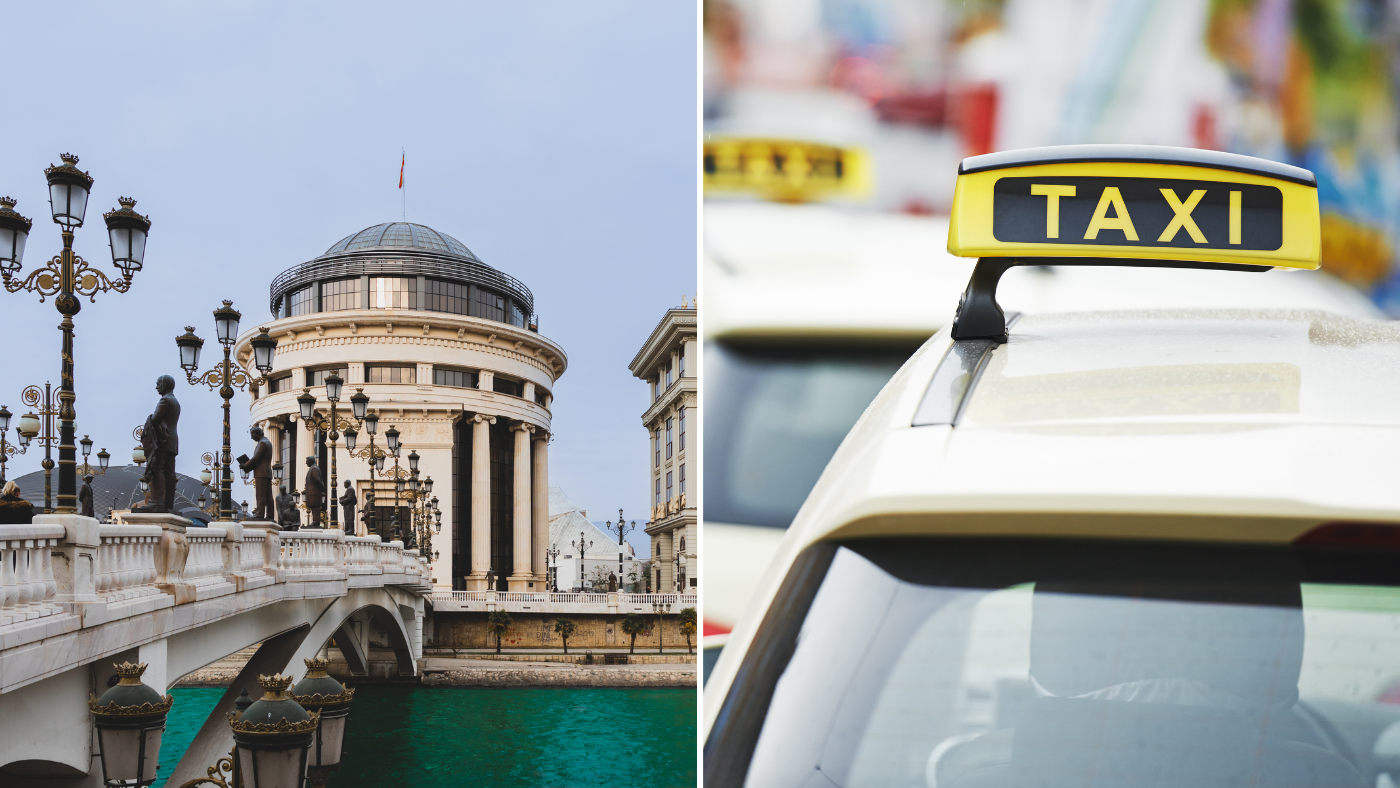
Recognizing Common Scams in Skopje
By knowing what to look for and what to expect when someone approaches you, seemingly offering their help or asking for money, you can easily avoid common scams in Skopje and ensure a hassle-free trip.
In this section, we’ll discuss a few common scams in Skopje, from the most common to the least likely, but still possible, to encounter.
Overpriced Taxis
Overpriced taxis are the most common scam a tourist could encounter in Skopje.
So much so that there’s a running joke among locals that you shouldn’t even open your mouth inside a taxi cause you’re going to be charged extra if you don’t speak the local language.
The reason for this is that most taxis in Skopje and Macedonia, in general, operate with a meter, which is supposed to show the price of your ride.
The starting price for most taxis in Skopje is usually 50 MKD (less than $1), with an additional 20 MKD ($0.50) per kilometer.
It’s worth mentioning that this price is subject to change, especially with the increasing cost of living, so it’s always best to ask the taxi driver or the company before getting in the car.
However, if you are visiting Skopje for the first time, chances are you don’t know the roads and streets, which is why you could potentially end up paying much more for a taxi than a local would.
This would be because some taxi drivers may try to take longer routes or detours to increase the price of your ride.
In fact, this situation actually occurred to us when we took a taxi for a trip from the main bus terminal to City Mall.
The driver didn’t have a meter inside the car and didn’t work for an official company. Instead, he had a yellow ‘TAXI’ sign attached to his car and charged us 300 MKD ($5) for the trip.
We didn’t realize how overpriced this was until we asked one of the staff members at a café in City Mall to call a cab for us.
The taxi that came to take us back charged only 120 MKD ($2) for the same ride.
Therefore, since this is such a common scam in Skopje, it’s definitely a good idea to be aware of it and try to avoid it as much as possible.
Additionally, some taxi drivers may even switch off the meter and pretend that it’s not working just so that they can take advantage of you and charge you an inflated rate, knowing that you are not familiar with the prices.
Here’s how to avoid overpaying for taxi rides:
Ask for the price before getting in a taxi and negotiate if necessary. If you feel like the driver is trying to overcharge you, don’t hesitate to ask for a lower price or try to find another taxi.
If you are unsure about the route, use Google Maps to track your ride and ensure the driver is taking the correct path. This way, you’ll also have an estimate of how much the ride should cost.
If you feel like you have been overcharged, ask for a receipt and report the issue to the taxi company or local authorities. Most taxis in Skopje have their phone numbers displayed on the car, so it’s easy to contact them.
Use official taxi services, which can be identified by their company logos and license numbers.
Ensure the taxi has a working meter and ask the driver to use it. If they refuse, choose another taxi.
Research typical fares from the airport or other popular locations to have a general idea of what to expect.
Ask locals for help. Even talking to a waiter at a restaurant or a cafe and asking for information on taxi fares or recommendations for reliable taxi companies can save you from being scammed.
The best taxi companies in Skopje:
- Naše Taxi: +389 21 51 52
- Taxi Global: +389 21 51 80
- In Taxi: +389 21 55 51
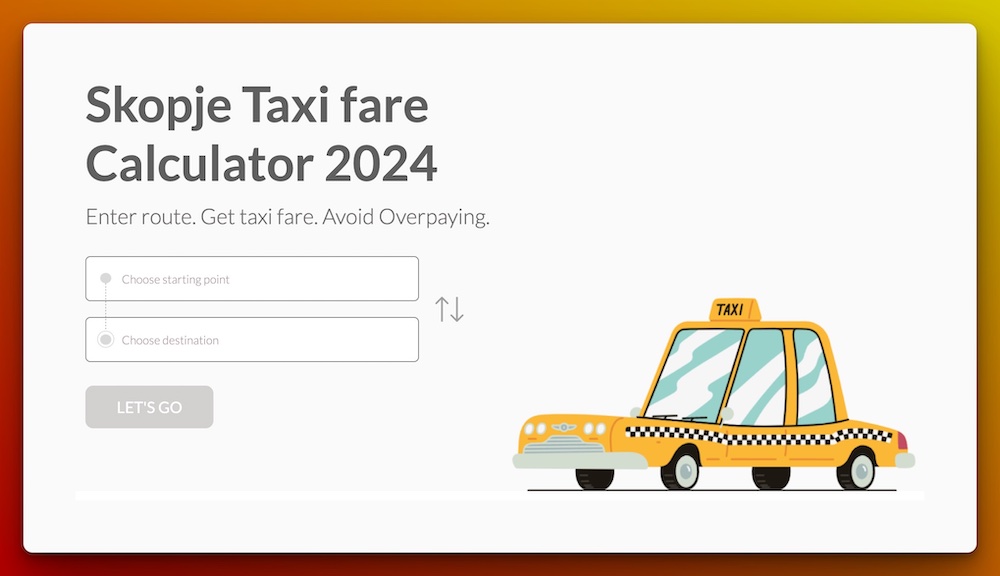
Counterfeit Goods or Overpriced Souvenirs
Another common scam or a tourist trap you may encounter while visiting Skopje is overpriced or counterfeit goods, especially in tourist areas of the city, such as the City Square, Old Bazaar, Matka Canyon, and Millennium Cross.
These can be anything from counterfeit perfumes, cosmetics, hair tools such as hair dryers, straighteners, curling irons, clothes, and overpriced souvenirs.
We particularly noticed the prevalence of counterfeits, especially behind the Old Bazaar, where there is a market with kiosk-like shops selling various goods, from souvenirs to clothing items and accessories.
They may even display popular brands such as Nike, Adidas, and Converse, but you can quickly tell that these are not authentic products upon closer inspection.
The same goes for cosmetics, and particularly counterfeit options for popular hairstyling tools, such as the Dyson Airwrap, which can easily be found for a fraction of the original price.
One particular kiosk was selling a counterfeit Dyson Airwrap for around 700 MKD (about $12), which caught our attention, as the original product costs well over $500.
Needless to say, these counterfeit goods are not of good quality, can easily break or malfunction, and are actually illegal to sell; however, these kinds of markets are highly unregulated, and therefore, these counterfeit goods continue to be sold.
Finally, if you are a tourist in Skopje and want to buy memorable souvenirs such as magnets, postcards, or even tapestries with themes of Skopje or other Macedonian cities and villages.
It’s best to avoid buying them in shops or markets located near popular tourist destinations as they tend to be significantly overpriced.
However, if you are visiting Skopje for a short time and aren’t venturing out of the city, you can at least check out multiple shops and compare the prices of similar goods to get a better idea of what’s considered reasonable.
Usually, shops situated further back in a particular tourist location, such as the Old Bazaar, would offer the same souvenirs for a lower price.
Here’s how to avoid purchasing overpriced or counterfeit goods in Skopje:
• Check out multiple shops when visiting tourist areas, as some might sell the same souvenirs for a lower price.
• Be aware of the quality and authenticity of goods. If something seems too good to be true or significantly cheaper than elsewhere, it’s likely counterfeit.
• Avoid buying from street vendors or unlicensed shops, as they are more likely to sell counterfeit goods.
• Research the typical prices for souvenirs or other items you are interested in purchasing before your trip.
• Ask locals for recommendations on reliable and authentic shops to buy souvenirs from. They can also help negotiate better prices for you.
• Be cautious of overly aggressive vendors or shop owners trying to push a sale or pressure you into buying something. Remember, it’s your money, and you have the right to decide where and what to spend it on.
Street “Performers” & “Artists”
Another common scam both tourists and locals alike commonly encounter in Skopje are street ‘performers’ or ‘artists’ that would stop you while you’re walking and try to convince you to let them create personalized art (such as a papercut silhouette, caricature drawing, or other types of art).
While some of these performers may be legitimate and talented artists, most are simply trying to scam tourists by charging an exorbitant amount for a mediocre work of art.
We once encountered a few “performers” who would stop us and try to persuade us to let them create a paper silhouette for a “donation.”
However, when we paid 100 MKD but only wanted to “donate” 50 MKD, the “artist” became a little aggressive and tried to shame us into not asking for the 50 MKD back.
When we persisted, simply because we didn’t like how he treated us at that point, he angrily went to his partner and was visibly irritated when asking if he had change.
He then returned to us and told us that he didn’t have 50 MKD to give us back and instead handed us a poorly made paper silhouette, which we later found out could easily be bought from street vendors for around 20-30 MKD.
This is just one example of many similar scams where these “performers” would pressure or trick tourists into paying for their subpar work, which often comes at a high price.
Additionally, you likely won’t receive any change back even if you overpay, as these “performers” often claim they don’t have any change on hand and may even try to shame you for asking for your money back.
Now, again, some artists are genuinely good at what they do, but in our experience, they don’t usually hassle people into buying whatever they are selling, so someone approaching you and trying to convince you to pay for something is the first red flag.
On the other hand, you may often find small kiosks in the city square with quality artwork created by the person selling it, and they usually have a set price tag for their art, so it is entirely up to you whether you want to purchase it.
Additionally, the city square is often bustling with people playing some instrument or singing, and while they may ask for donations, it’s not a scam per se, as you can freely choose whether to donate money or not.
However, if someone aggressively pushes you to pay them for their “performance,” it’s best to walk away.
Lastly, Skopje also has many legitimate art galleries showcasing local artwork that you can visit and purchase from, so if you’re interested in buying art as a souvenir, it’s worth checking them out instead of falling for street performers’ scams.
Here are a few galleries in Skopje where you can check out and purchase local art as souvenirs:
The Museum of Contemporary Art: Located in the Old Railway Station building, this museum showcases contemporary artwork from both local and international artists.
Galerija Martinoski: This art gallery showcases original works by Macedonian artist and academic Nikola Martinoski (1903-1973), who is often referred to as the founder of contemporary Macedonian art.
Art Gallery Ripida: Located in the cultural center of Skopje, this gallery exhibits various forms of art from local and international artists.
Beggars Using Distractions
Another common scam tourists and locals alike commonly encounter in Skopje is beggars using distractions such as children, animals, and even fake injuries to get money from unsuspecting passersby.
When visiting Skopje for the first time, you will quickly realize how prevalent begging for money is.
While some of these people are genuinely in a bad situation and need help, it’s not uncommon for others to take advantage of compassionate tourists and scam or (albeit much rarer) even rob them.
Most of these beggars will use distractions to gain sympathy and make it easier for people to open their wallets.
One common tactic beggars use is to approach you with a sad story and present you with a disabled child or animal, asking for money to help them.
They may also use props such as crutches or bandages to look more convincing.
However, it’s essential to be aware that some of these stories may be fake, and the people behind them may not be genuinely disabled or in need.
It’s best to exercise caution when approached by beggars and avoid giving them money, as it may encourage them to continue this deceptive behavior or even become aggressive, especially if you don’t give them ‘enough’ money.
One particularly uncomfortable situation that happened to us was being approached by a teenage boy begging for money while we were having lunch at one of the restaurants on the promenade.
Not understanding the currency very well back then, we offered what seemed enough money for a small meal, but this prompted the boy to become aggressive and say that this wasn’t enough money for him to buy a burger.
We then had to call the restaurant’s staff to help us out, and we were anxious after leaving the restaurant that the boy would come back and cause trouble.
If you genuinely want to help those in need while visiting Skopje, consider donating to local charities or NGOs that work with homeless and disadvantaged people.
This way, you can ensure your money goes towards a good cause and not potentially fuel harmful behavior or scams.
Here are a few charity organizations in Skopje that you can consider donating to:
SOS Children’s Village Skopje – An organization that provides loving homes to children who have lost parental care.
One Can Youth – An organization that aims to enable a better tomorrow for children and young people from different family structures.
NGO Open The Windows – An organization that provides online learning for children with special educational needs.
Fake Tour Guides Offering Services
Now, this is a less common tourist scam in Skopje, but as we notice an increase in tourism in Macedonia’s capital, it’s definitely something that could sadly become more prevalent in the future.
Fake tour guides are already a thing in Ohrid, another Macedonian city popular with tourists, and it’s already starting to make its way to Skopje.
The scam usually starts with someone approaching you, claiming to be a licensed tour guide, and offering their services.
They may show you fake credentials or even mention popular tourist spots you’re interested in visiting, such as Matka Canyon, the Millennium Cross, etc.
However, you may notice that these unlicensed “guides” will try to charge exorbitant fees for their services, taking advantage of unsuspecting tourists.
Keep in mind that visiting places like Matka Canyon or the Millennium Cross can easily be done by getting on a bus, for which a daily ticket costs $2, or paying $10-15 for a taxi.
Neither location requires an expensive guided tour unless the tour offers activities such as rafting on Matka Lake, visiting some of the caves, or at least a meal at a restaurant that’s included in the price.
If you want to book a guided tour of Skopje, make sure to do your research beforehand and only go with licensed and reputable agencies or guides.
Still, if the fees seem too high, even if the agency or guide is reputable, don’t hesitate to negotiate or look for alternative options.
Skopje isn’t a huge city and is well connected by public transport, so there’s nothing you can’t do on your own that would require a guided tour unless, again, the tour consists of extra activities and is genuinely a good deal.
Fake Ticket Inspectors in Public Buses
Another less common but possible scam in Skopje is fake ticket inspectors on public buses.
While it’s essential to have a valid ticket when using public transport in Skopje because legit inspections are quite common, you need to be aware that there may be people posing as ticket inspectors who will try to trick you into paying fines for not having a proper ticket or trying to take advantage of tourists.
These fake ticket inspectors may approach you and flash some official-looking ID, asking to see your ticket.
Then, they may try to intimidate you into thinking your ticket is invalid or incorrect.
They may even threaten to call the police or issue an even heftier fine if you refuse to pay the initial fine they are asking for.
In reality, these people are just trying to scam unsuspecting tourists and even locals who may not be familiar with the public transport system.
Here’s how to avoid falling victim to this scam:
Always make sure you have a valid ticket when taking the bus and keep it on hand to show if needed.
If someone claiming to be a ticket inspector approaches you and tries to hassle you over a supposedly invalid ticket, don’t be afraid to ask them for their official identification and make sure it matches the description and name of actual ticket inspectors.
If you feel like something isn’t right, or the scammer is starting to get aggressive, don’t hesitate to call the police or ask for help from other passengers on the bus. It’s always better to be safe than sorry in these situations.
Fake Police Officers
Again, this one is quite a rare sight, but through conversations with locals who have witnessed or heard of similar incidents, it’s worth mentioning as a potential scam to be aware of when visiting Skopje.
Fake police officers could be a particularly intimidating experience, as most people wouldn’t doubt the credibility of someone claiming to be a law enforcement officer, even if the interaction feels off.
The scam usually starts with someone approaching you, claiming to be a police officer, and asking to see your passport or ID.
They may mention some vague laws that they claim you have broken, such as taking photos in restricted areas, not having proper documentation on you, etc., and demand you to pay a fine.
They may even show you a fake badge or ID to make the interaction seem legitimate.
In some cases, they may try to claim that there’s been a spate of counterfeit money in the area, and they need to check your wallet, which, as you may guess, may lead to your cash disappearing.
Here’s how to avoid falling victim to this scam:
• Make sure you respect local laws, such as not crossing red lights, not taking photos in restricted areas, not using counterfeit money, etc., as this way, you will be quicker to identify when something doesn’t feel right.
• Always make sure to have your passport or ID on hand when exploring Skopje, but don’t just hand it over without confirming.
• Never hand over your wallet to anyone, not even a police officer claiming they need to check for counterfeit money.
• If you suspect that the police officer is a scam artist, communicate with them and explain that you don’t feel comfortable handing your personal identification. Always remember that they may actually be a real police officer, so avoid insulting or threatening them, as this behavior can get you arrested.
• You are well within your rights to ask for their official credentials and even call the police station to verify their identity if you still feel suspicious, so don’t be afraid to do it.
• If you feel like the situation is becoming threatening or unsafe, don’t hesitate to seek help from other people in the area or call the police for assistance.
Again, this is a very rare scenario in Skopje, but it’s better to be prepared and informed than caught off guard.
Friendly ATM Helper
Finally, this is another scam that’s not likely to happen, but it used to be a thing in Skopje, with, sadly, many seniors being the primary target of this scam.
A friendly ATM helper is someone who will offer to help you withdraw money from an ATM, usually by offering to hold your card or enter your PIN code on your behalf.
They may also try to distract you while you’re withdrawing money, such as by engaging you in conversation or asking for directions.
In some cases, they may even give you fake advice on using the ATM or claim that it’s not working correctly and try to convince you to go to another one.
Once they have your card and PIN code, they will make a swift getaway with your money.
Here’s how to avoid this scam:
• Always use ATMs in secure and well-lit areas, preferably ones that are near banks or other reputable establishments.
• Never let anyone, even a friendly stranger, handle your card or enter your PIN code for you.
• If someone approaches you while you’re using the ATM and tries to engage you in conversation or offers to help, politely decline and finish your transaction as quickly as possible.
• If you feel like the person is becoming aggressive or suspicious, don’t hesitate to call for help from nearby security personnel or ask for assistance from other people in the area.
• Lastly, always cover your PIN code when entering it into the ATM and check for any signs of tampering before using the machine.
Safety Measures for Tourists
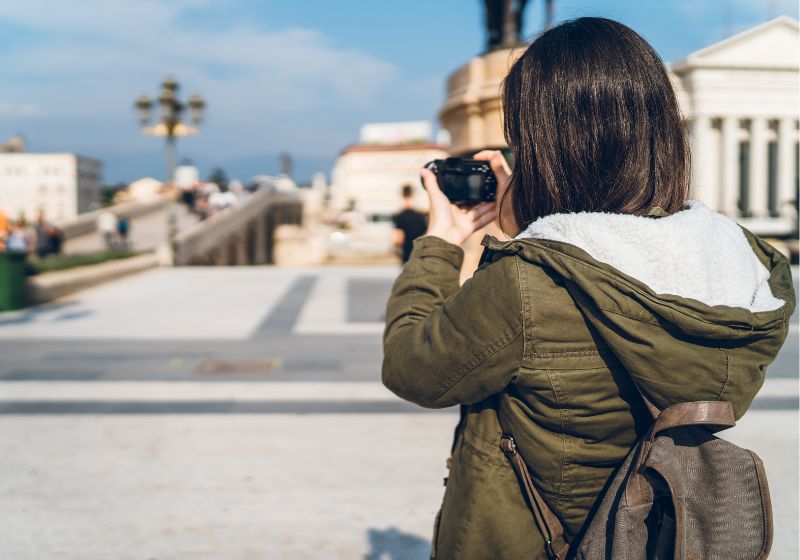
As a traveler visiting Macedonia’s capital city, you should know that Skopje is a very safe city, with violent crimes and incidents being sporadic, but nonetheless, it’s essential to stay informed and take appropriate safety measures.
In this section, we will discuss some tips and precautions to ensure your trip is a pleasant and safe experience.
Using Technology for Safe Travel
Technology can be your best ally when navigating the streets of Skopje.
Use Google Maps to explore the city, find local attractions, and avoid getting lost in unfamiliar neighborhoods.
To enhance your safety while using Wi-Fi networks, consider setting up two-factor authentication for your private account logins, enabling a firewall, and using a VPN.
Turning off your Wi-Fi when not in use and confirming the name of a Wi-Fi network with staff members at your accommodations will help protect your personal information from potential scammers.
Travel Insurance
Don’t underestimate the importance of travel insurance.
Purchasing a plan appropriate for your trip can provide medical coverage, emergency assistance, and protection against unexpected cancellations or trip interruptions.
Research and compare different travel insurance options to ensure you have the most suitable coverage for your needs.
Keeping Your Passport Secure
Your passport is a valuable document, and keeping it secure while traveling is essential.
Use a hotel safe or a secure money belt to store your passport and other important documents. Keep a photocopy of your passport separately in case of emergencies or loss.
Additionally, consider using a passport cover to protect against theft or damage.
Legal Assistance
If you find yourself in a situation where you require legal assistance as a visitor in Macedonia, there are several resources available to you:
Macedonian Helsinki Committee: This non-governmental organization offers legal aid and resources. Their office is based in Skopje, and they can be reached at +389 2 3119 073.
Institute for Human Rights: Another non-profit organization that offers free legal advice and can be reached at +389 2 324 3331.
Additionally, consider contacting your consulate or embassy if you fall victim to a robbery or tourist scam in Skopje.
Financial Tips for Travelers
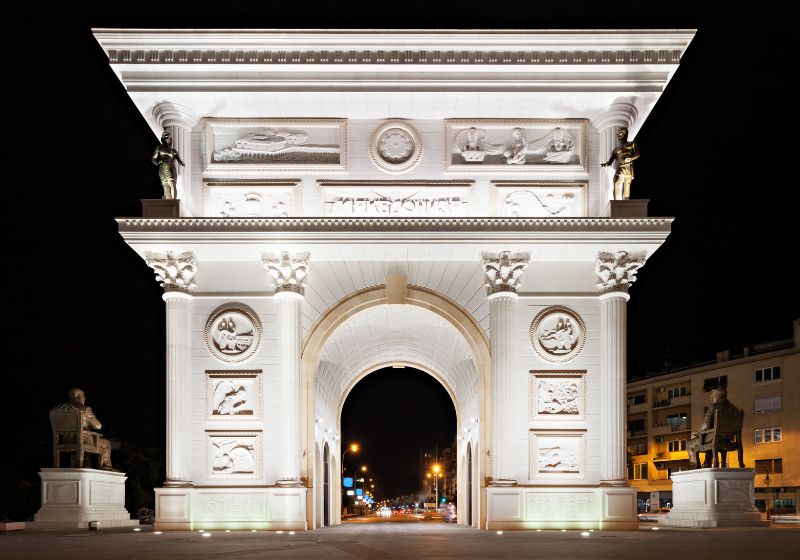
Managing your finances while traveling in Skopje or any foreign destination is crucial for a stress-free experience.
In this section, we’ll offer some tips on how to deal with currency, avoid ATM and bank fees, and use credit cards wisely.
Dealing with Currency
Before arriving in Skopje, it’s helpful to familiarize yourself with the local currency, the Macedonian Denar (MKD).
To avoid unfavorable exchange rates, it is advisable to exchange your cash locally.
Keep an eye on the current exchange rate, and always carry a small amount of local currency for emergencies.
PRO-TIP: The Exchange office in the airport offers the worst rates. Try to avoid them if possible.
Avoiding ATM and Bank Fees
Withdrawals from cash machines can come with fees, especially if you’re using a foreign card.
To minimize these expenses, consider the following tips:
- Research your bank’s international partners for lower fees or free withdrawals.
- Opt for using ATMs in banks, as they are more likely to have better security and more accurate exchange rates.
- Withdraw larger amounts to limit the number of transactions and reduce withdrawal fees.
- Notify your bank about your travel plans to avoid unnecessary holds on your account due to suspicious activity.
Using Credit Cards Wisely
Credit cards can provide ease and convenience during your trip, but be aware of potential fees and risks.
To use your credit card sensibly, follow these guidelines:
• Choose travel-friendly credit cards that don’t charge foreign transaction fees, and notify your card issuer about your travel plans. This could save you 2% to 4% extra charges on purchases made outside your home country.
• Keep your credit card secure, and avoid using it in sketchy areas or with merchants you don’t trust.
• To minimize the risk of being a victim of scams, don’t keep all your valuables and essential documents in one place. Also, consider wearing a discreet money belt or a zippered cross-body bag for added security.
By following these tips and staying vigilant, you can ensure a financially safe and enjoyable trip to Skopje.
Staying Safe in Tourist Destinations
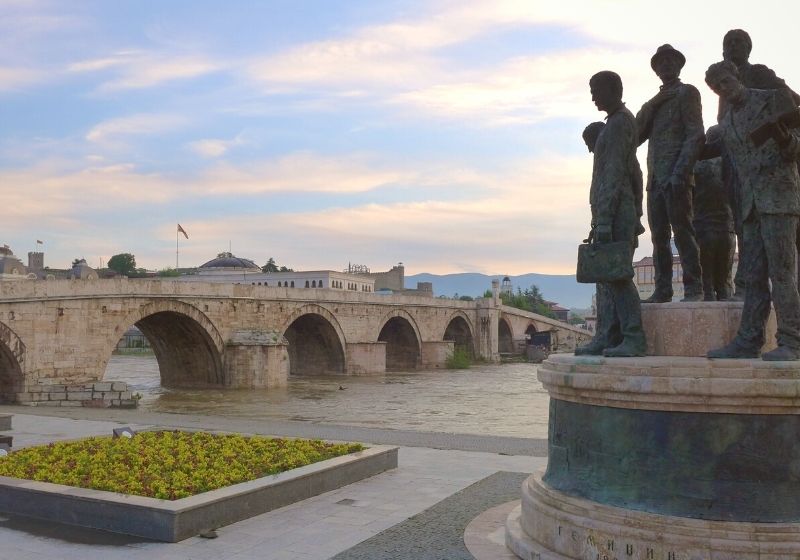
When traveling to tourist destinations like Skopje, being aware of common scams and learning how to stay safe is essential.
In this section, we will share some tips to help you avoid unwanted attention and choose reputable restaurants and nightclubs to spend your time and meet locals that can help you get familiarized with the local culture and customs and also provide information that could potentially help you avoid some scams we haven’t covered here.
Avoiding Unwanted Attention
One of the best ways to stay safe while exploring tourist destinations is to blend in with the locals as much as possible.
Dress conservatively and modestly, avoiding flashy or revealing clothing that might attract potential scammers or thieves.
Try to avoid using loud voices or drawing attention to yourself when taking photos.
When visiting popular attractions, be aware of your surroundings and use caution when interacting with strangers.
Keep your valuables hidden and secure to minimize the risk of theft.
Avoid leaving your valuables unattended or on restaurant tables, particularly restaurants or cafes that are positioned on busy pavement and don’t have a fence around them to prevent potential theft.
Remember that common tourist scams often prey on unsuspecting visitors, so trust your instincts and avoid any uncomfortable or suspicious situation.
Choosing Reputable Restaurants and Nightclubs
When dining out and enjoying Skopje’s nightlife, choosing reputable establishments is important while avoiding potential scams.
To ensure a safe and enjoyable experience, research popular restaurants and nightclubs before your trip.
You can read online reviews, ask locals for recommendations, or consult guidebooks for information on the best places in town.
This will help you identify reliable venues with positive reputations.
Before entering a restaurant or nightclub, take a moment to observe the establishment from the outside.
A reputable place will typically have clear signage with its name and logo, a clean and inviting appearance, and a good number of locals or tourists as patrons.
Be cautious of establishments that use aggressive tactics or touts to lure you in, as these can often be signs of a scam.
Additionally, avoid conflicts and altercations, especially in restaurants, bars, and nightclubs.
Remember, it’s never a good idea to get into arguments with locals, especially in foreign countries, as it can often lead to unsuspected dangerous situations.
If you feel like a situation is becoming unsafe or uncomfortable, leave the establishment and seek help from nearby authorities or other people in the area.
While enjoying your time in Macedonia, prioritize your safety by staying vigilant, sticking to reputable establishments, and avoiding unwanted attention.
If you follow these guidelines, you’ll be better prepared to enjoy a safe and memorable trip.
This guide was first published on May 15, 2023 and was last updated on April 12, 2024. For more information, please contact us at contact@skopjeguide.com.